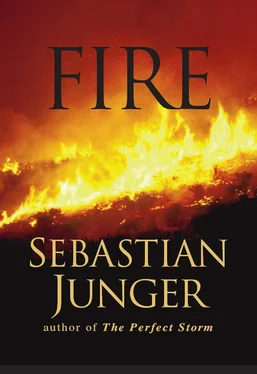Massoud was so far ahead of his commanders that at times he seemed unable to decide whether to explain his thinking or to just give them orders and hope for the best. The Soviets, having lost as many as fifteen thousand men in Afghanistan, reportedly now study his tactics in the military academies. And here he was, two decades later, still waging war from some bunker, still trying to get his commanders to grasp the logic of what he was doing.
It was getting late, but Massoud wasn’t even close to being finished. He has been known to work for thirty-six hours straight, sleeping for two or three minutes at a time. There was work to do, and his men might die if it wasn’t done well, and so he sat poring over an old Soviet map, coaxing secrets from it that the Taliban might have missed. At one point he turned to one of the young commanders and asked him whether he could fix the hulk of a tank that sat rusting on a nearby hill.
“I have already been up there to see it,” the young man said. “I have fixed tanks much worse than that.”
There were a total of three destroyed tanks; Massoud thought they all could be salvaged. One was stuck in an alleyway between two houses, and the young commander said the passageway was too narrow for them to drag it out. “Buy the houses, destroy them, and get it out,” Massoud said. “Get two more tanks from Rostaq; that’s five. Paint them like new and show them on the streets so people will see them. Then the Taliban will think we’re getting help from another country.”
On and on it went, commander by commander, detail by detail. Don’t shell from Ay Khanom Hill; you’re just wasting your ammunition. Don’t shell any positions near houses or towns; the Taliban are too deeply dug in in those spots and you’ll just hurt civilians. Send your men forward in jeeps to save the heavy machinery and shell heavily beforehand to raise a lot of dust. That way, the Taliban won’t see the attack.
When Massoud was growing up in Kabul, he was part of a neighborhood gang that had regular battles with other gangs. One particularly large gang would occupy a hilltop near his house, and he and his friends would go out and challenge them. Naturally enough, Massoud was the leader. He would split his force, sending one half straight up the hill while the other half circled and attacked from the rear. It always worked. It still worked.
Massoud sat cross-legged on the floor, bent forward at the waist, methodically opening and eating pistachios. His head hung low and swung from side to side as he spoke. He had a slight tic that ran like a shiver up his back and into his shoulders. “Get me your best guys,” he said, looking around. “I don’t want hundreds. I want sixty of your best. Sixty from each commander. Tomorrow I want to launch the best possible war.”
Like so many fundamentalist movements, the Taliban were born of war. After the Soviet Union invaded Afghanistan on December 27, 1979, it ultimately sent in eight armored divisions, two enhanced parachute battalions, hundreds of attack helicopters, and well over a hundred thousand men. What should have been the quick crushing of a backward country, however, turned into the worst Soviet defeat of the Cold War. The very weaknesses of the fledgling resistance movement—its lack of military bases, its paucity of weapons, its utterly fractured command structure—meant that the Soviets had no fixed military objectives to destroy. Fighting Afghans was like nailing jelly to a wall; in the end there was just a wall full of bent nails. Initially using nothing but old shotguns, flintlock rifles, and Lee-Enfield .303s left over from British colonial days, the mujahidin started attacking Soviet convoys and military bases all across Afghanistan. According to a CIA report at the time, the typical life span of a mujahidin RPG operator—rocket-propelled grenades were the antitank weapon of choice—was three weeks. It’s not unreasonable to assume that every Afghan who took up arms against the Soviets fully expected to die.
Without the support of the villagers, however, the mujahidin would never have been able to defeat the Soviets. They would have had nothing to eat, nowhere to hide, no information network—none of the things a guerrilla army depends on. The Soviets knew this, of course, and by the end of the first year—increasingly frustrated by the stubborn mujahidin resistance—they turned the dim Cyclops eye of their military on the people themselves. They destroyed any village the mujahidin were spotted in. They carpet-bombed the Panjshir Valley. They cut down fruit trees, disrupted harvests, tortured villagers. They did whatever they could to drive a wedge between the people and the resistance. Still, it didn’t work. After ten years of war, the Soviets finally pulled out of Afghanistan, leaving behind a country full of land mines and more than one million Afghan dead.
A country can’t sustain that kind of damage and return to normal overnight. The same fierce tribalism that had defeated the Soviets—“radical local democracy,” the CIA termed it—made it extremely hard for the various mujahidin factions to get along. (It would be three years before they would be able to take Kabul from the Communist regime that the Soviets had left.) Moreover, the mujahidin were armed to the teeth, thanks to a CIA program that had pumped three billion dollars’ worth of weapons into the country during the war. Had the United States continued its support—building roads, repatriating the refugees, clearing the minefields—Afghanistan might have stood a chance of overcoming its natural ethnic factionalism. But the United States didn’t. No sooner had the Soviet-backed government crumbled away than America’s Cold War–born interest in Afghanistan virtually ceased. Inevitably, the Afghans fell out among themselves. And when they did, it was almost worse than the war that had just ended.
The weapons supplied by the United States to fight the Soviets had been distributed through Pakistan’s infamous Inter-Services Intelligence branch. The ISI, as it is known, had chosen a rabidly anti-Western ideologue named Gulbuddin Hekmatyar to protect its strategic interests in Afghanistan, so of course the bulk of the weapons went to him. Now, using Hekmatyar to reach deep into Afghan politics, Pakistan systematically crippled any chance of a successful coalition government. As fighting flared around Kabul, Hekmatyar positioned himself in the hills south of the city and started raining rockets down on the rooftops. His strategy was to pound the various mujahidin factions into submission and gain control of the capital, but he succeeded merely in killing tens of thousands of civilians. Finally, in exchange for peace, he was given the post of prime minister. But his troops remained where they were, the barrels of their tanks still pointed down at the city they had largely destroyed.
While the commanders fought on, life in Afghanistan sank into a lawless hell. Warlords controlled the highways; opium and weapons smuggling became the mainstay of the economy; private armies battled one another for control of a completely ruined land. This was one of the few times that Massoud’s forces are thought to have committed outright atrocities, massacring several hundred to several thousand people in the Afshar District of Kabul. There is no evidence, however, that Massoud gave the orders or knew about it beforehand. As early as 1994 Pakistan, dismayed by the fighting and increasingly convinced that Hekmatyar was a losing proposition, began to look elsewhere for allies. Its attention fell on the Taliban, who had been slowly gaining power in the madrasahs while Afghanistan tore itself apart. The Taliban were religious students, many of them Afghan refugees in Pakistan, who were trained in an extremely conservative interpretation of the Koran called Deobandism. Here, in the tens of thousands of teenage boys who had been orphaned or displaced by the war, Pakistan found its new champions.
Читать дальше












